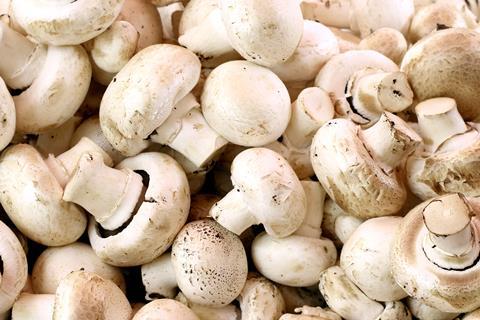Organic veg box company has raised prices to cover growing chestnuts and portobellos on a peat-free substrate, as trials on lettuce and tomatoes continue

Organic veg box company and grower Riverford has become the first retailer to sell peat-free mushrooms after raising the price of punnets to cover the increased costs of growing in the new substrate.
In a newsletter to customers this week, founder Guy Singh-Watson wrote: “Our chestnut and portobello mushrooms are now grown on a peat-free substrate. To support the grower with the cost and other economic challenges, we need to charge an extra 5p per punnet for chestnuts and 25p for portobellos.
“We have also just planted our tomatoes, starting them for the third year in a peat-free growing medium. So far, our trials suggest that we will lose 12 per cent of the yield compared to using peat – but we will take the hit, knowing that innovation comes with cost and complexity.”
Riverford organic chestnut mushrooms are currently £2.50 for a 200g punnet, while portobellos are £3.50 for the same amount.
The Devon-based company, which owns three farms of its own and buys from numerous other organic producers, is part of a two-year trial looking at peat-free growing media for key salad and field crops. Funded by Innovate UK, the trial is in partnership with plant raisers Delfland Nurseries, Coventry University’s Centre for Agroecology, Water and Resilience (CAWR) and environmental consultants Cambridge Eco.
The project aimed to develop organic, peat-free growing media suitable for blocks that can be handled by existing machinery at the plant nursery stage and during transplanting, with the findings also relevant for conventional production.
“This work could have hugely positive implications across the industry, which is currently still propped up by peat, as well as supporting the government to go peat free. We’ve tested dozens of combinations and finally found a blend that supports root health and commercial viability and are now actively looking at funding options to develop the recipe to scale,” said Anna David, Riverford’s sustainability researcher.
As part of the project, Riverford trialled five different peat-free mixtures on lettuce, tracking progress through a series of films on YouTube.
While the specific mix for the peat-free growing media has not been released, the focus has been on materials available in the UK.
Riverford said it uses around 228 cubic metres of peat each year to grow seedlings in peat blocks, equating to 38 tonnes of carbon (tCO2e) emissions. The peat-free trial is part of its mission to “go beyond organic” and push the boundaries of sustainable farming.
“Peat is a reliable, consistent, and cheap growing medium for raising plants and mushrooms. However, draining peat bogs is ecologically disastrous,” said Singh-Watson.
“There are alternatives, but they are much more expensive, and, so far, not as reliable or easy to work with – but we’re determined to make it work.
“Eventually, we will learn to grow veg just as well without peat – but only if we keep doing the work now.”



